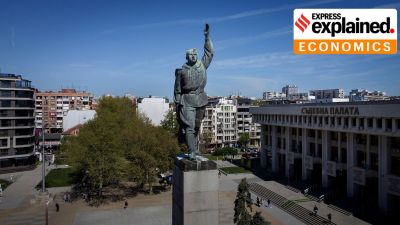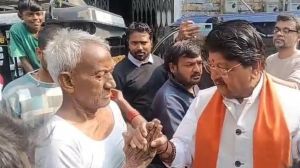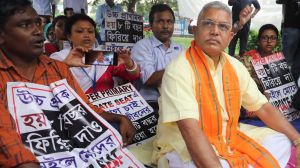Costlier, every day
If law makers, in utter disregard of all scruples of political propriety, democratic norms or ethical considerations, vote to themselves mor...

If law makers, in utter disregard of all scruples of political propriety, democratic norms or ethical considerations, vote to themselves more money and perks at public expense, is there no remedy and no accountability? Should there be no limits to the loot of the people8217;s hard-earned money, on denuding the public exchequer of the funds badly needed for development and ameliorating the hardships of the common man? Has not the 8216;value-based8217; national leadership any say or control in such matters?
The strongest trade union or professional fraternity today is that of the politicians. Nothing else would justify leaders of all parties coming together to pass in ugly haste measures to better their personal emoluments and perks. A matter which should have caused public concern and outcry has gone almost unnoticed. The usually vigilant media also has made no mention of the open defrauding of the public exchequer by the Salary, Allowances and Pension of Members of Parliament Amendment Bill 2003.
The president has since given his assent to the Bill and it has become law. One of its most preposterous provisions is that a pension for life shall be paid to every person who has been an MP at any time 8220;for any period8221;, that is, if a person remained an MP even for one day, he would be entitled to a lifelong pension. Pension is no more for old age care, nor is it related to a minimum number of years of service. Such a pension scheme is unheard of in any other parliament of the world.
History of sorts was made in 1991, on the last day of the last session of the ninth Lok Sabha, when the two houses of Parliament, within minutes and without debate, unanimously adopted a Bill inter alia providing for payment of pension to every former MP even if he had put in only one year8217;s service in Parliament. The passing of the Bill generated loud protests from concerned citizens. Strong articles, editorials and letters to the editor appeared in national dailies. A plea was made to the president not to give his assent to the 8220;outrageous8221; Bill. Finally, the president did not accord assent to the Bill and returned it. It never became law. This became the only example of a Bill unanimously passed by the two houses not being allowed to become law because of the president not giving his assent.
The present Bill that has received president8217;s assent and become law is far more obnoxious than the ninth Lok Sabha Bill. Now not even one year8217;s service is required to entitle an MP for life pension. Any period, even a day, is enough to make it a charge on the Consolidated Fund of India during the life time of the member and also to take care of the survivors through family pension. Yet, unlike 1991, the passing of the Bill and its enactment have met a conspiracy of silence.
Pensions for MPs have an interesting history. These are governed by the Salaries, Allowances and Pension of Members of Parliament Act 1954 as amended from time to time. Article 106 of the Constitution provides that MPs shall be entitled to receive such salaries and allowances as Parliament may by law determine. The Constitution does not make mention of any pension. Also, the original 1954 Act was for salaries and allowances only. It did not contain any provision for pension. It was only in 1976 8212; during Emergency 8212; that former members who had completed five years of membership were made eligible for a non-contributory pension of Rs 300 per month from September 9 1976 by an Amendment Act. In addition to Rs 300 per month for a total of five years of membership, provision was also made for 50 per month for each year8217;s service over and above the five years, subject to the total pension not exceeding Rs 5000 per month.
Through an Amendment Act in 1981 the eligibility for pension was extended to those former MPs whose service fell short of five years by 60 days or less. This amendment also made members of the Provisional Parliament 1950-1952 eligible for pension even if they did not subsequently become members of either House of Parliament. By another amendment in 1985, the minimum monthly pension was increased to Rs 500 and the maximum limit removed. An amending act in 1988 inserted a provision for payment of a pension of Rs 500 for five years to the spouse or dependent of a member who died during the term of his membership.
Finally, the present position is that all former members of Parliament, Provisional Parliament or Constituent Assembly, irrespective of the period of their membership, are entitled for life to a minimum pension of Rs 3000 per month in addition to any other pensions they may be getting. For every year of service after a term, an additional amount of Rs 600 per month for each year shall be payable without any upper limit on the total pension amount. Also, there is provision for family pension with family members defined liberally.
There may be some differences of opinion on whether our representatives are under-paid or over-pampered and over-paid for the services they render to society. But, according to one estimate, it has been suggested that if every MP is paid a sum of Rs 2 lakh per month and all the perks are withdrawn, the public exchequer would be the gainer. If that be so, the actual monthly payments to each MP in cash or kind or in the form of exemptions, immunities and facilities far exceed Rs 2 lakh per month. This does not include the Rs 2 crore per year placed at the disposal of each MP under the MPLAD scheme.
The NDA government came to power on the promise of implementing a national agenda for good governance. It stood committed to reducing public expenditure. What is happening is just the reverse. In particular, the expenditure by politicians on themselves has been going up by leaps and bounds. Maintaining the army of politicians in our democracy is becoming costlier every day. No wonder, their credibility is being eroded and the people are losing faith in their own so-called representatives.
The writer was a member of the Constitution Review Commission
- 01
- 02
- 03
- 04
- 05































